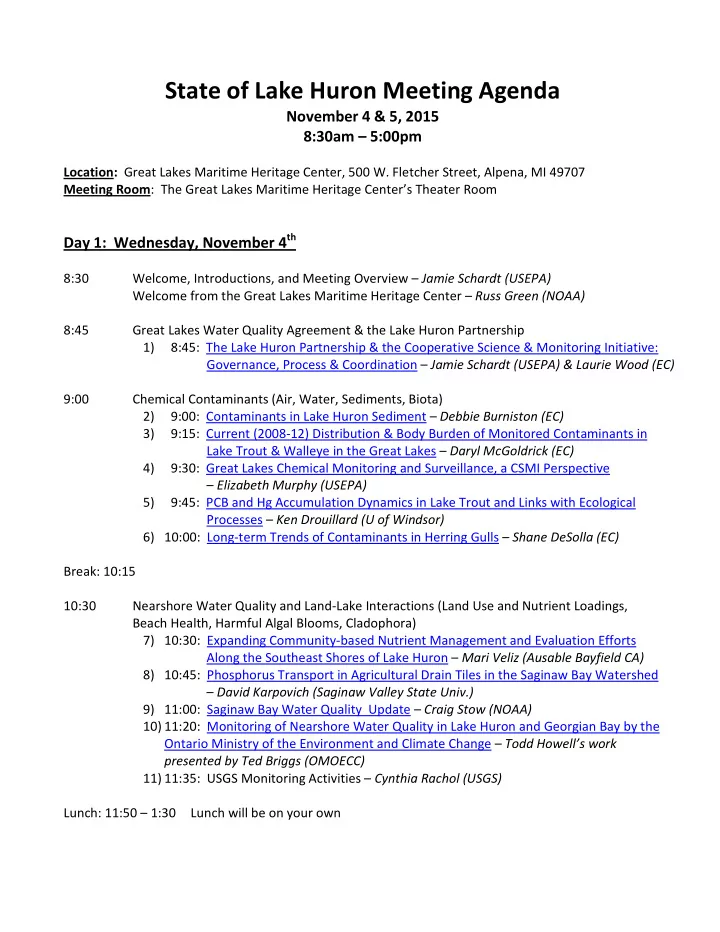

State of Lake Huron Meeting Agenda November 4 & 5, 2015 8:30am – 5:00pm Location: Great Lakes Maritime Heritage Center, 500 W. Fletcher Street, Alpena, MI 49707 Meeting Room : The Great Lakes Maritime Heritage Center’s Theater Room Day 1: Wednesday, November 4 th 8:30 Welcome, Introductions, and Meeting Overview – Jamie Schardt (USEPA) Welcome from the Great Lakes Maritime Heritage Center – Russ Green (NOAA) 8:45 Great Lakes Water Quality Agreement & the Lake Huron Partnership 1) 8:45: The Lake Huron Partnership & the Cooperative Science & Monitoring Initiative: Governance, Process & Coordination – Jamie Schardt (USEPA) & Laurie Wood (EC) 9:00 Chemical Contaminants (Air, Water, Sediments, Biota) 2) 9:00: Contaminants in Lake Huron Sediment – Debbie Burniston (EC) 3) 9:15: Current (2008-12) Distribution & Body Burden of Monitored Contaminants in Lake Trout & Walleye in the Great Lakes – Daryl McGoldrick (EC) 4) 9:30: Great Lakes Chemical Monitoring and Surveillance, a CSMI Perspective – Elizabeth Murphy (USEPA) 5) 9:45: PCB and Hg Accumulation Dynamics in Lake Trout and Links with Ecological Processes – Ken Drouillard (U of Windsor) 6) 10:00: Long-term Trends of Contaminants in Herring Gulls – Shane DeSolla (EC) Break: 10:15 10:30 Nearshore Water Quality and Land-Lake Interactions (Land Use and Nutrient Loadings, Beach Health, Harmful Algal Blooms, Cladophora) 7) 10:30: Expanding Community-based Nutrient Management and Evaluation Efforts Along the Southeast Shores of Lake Huron – Mari Veliz (Ausable Bayfield CA) 8) 10:45: Phosphorus Transport in Agricultural Drain Tiles in the Saginaw Bay Watershed – David Karpovich (Saginaw Valley State Univ.) 9) 11:00: Saginaw Bay Water Quality Update – Craig Stow (NOAA) 10) 11:20: Monitoring of Nearshore Water Quality in Lake Huron and Georgian Bay by the Ontario Ministry of the Environment and Climate Change – Todd Howell’s work presented by Ted Briggs (OMOECC) 11) 11:35: USGS Monitoring Activities – Cynthia Rachol (USGS) Lunch: 11:50 – 1:30 Lunch will be on your own
1:30 Nearshore Water Quality and Land-Lake Interactions (Land Use and Nutrient Loadings, Beach Health, Harmful Algal Blooms, Cladophora) 12) 1:30: Remote Sensing & In-Situ Observations in Lake Huron (including Saginaw Bay) – Steve Ruberg (NOAA) 13) 1:45: Nearshore to Offshore Trends in Zooplankton & Preyfish in the 2012 CSMI Year – David Bunnell (USGS) 2:00 Aquatic Ecosystem Structure, Function, and Change (Nutrients and Major Ions, Benthic and Pelagic Food Web Changes, Invasive Species) 14) 2:00: Trends in Benthic Macroinvertebrates throughout the Lake Huron System – Tom Nalepa (U of Michigan) 15) 2:15: Long-term Trends in Lake Huron’s Lower Foodweb – Paul Horvatin (USEPA) 16) 2:30: High Resolution Observations of Diel Spatial Interactions of Nutrients, Plankton, and Larval Fishes in Lake Huron – Henry Vanderploeg (NOAA) Break: 2:45 17) 3:00: Lake Huron Offshore Water Quality – Alice Dove (EC) 18) 3:15: Patterns in Lake Huron Pelagic Food Web – David Warner (USGS) 19) 3:30: Nutrient and Energy Flows in the Food Web of Lake Huron – Doug Haffner (U of Windsor) 3:45 Habitats and Species: Status, Trends, and Stressors (Coastal Wetlands, Coastal Terrestrial Habitat, Tributaries and Hydrological Connectivity, Population Status and Trends) 20) 3:45: Health, Population Trends and Ecological Changes of Colonial Waterbirds – Shane DeSolla (EC) 21) 4:00: Changes in Northern Lake Huron Colonial Waterbird Nesting Colonies – James Ludwig (Eco-toxicologist Consultant) 22) 4:15: Invasive Eurasian Watermilfoil and Indigenous Macrophyte Density Shifts in the Les Cheneaux Islands During a Four Year Period Coinciding with an Unprecedented Rise in Lake Huron Water Levels – authored by Robert Smith, Roger Gauthier, and Mark Clymer (Les Cheneaux Watershed Council) 4:25 Question & Answer, Group Discussion, Etc. End of Day 1: 4:45pm
State of Lake Huron Meeting Agenda November 4 & 5, 2015 Day 2: Thursday, November 5 th 8:30 Habitats and Species: Status, Trends, and Stressors (Coastal Wetlands, Coastal Terrestrial Habitat, Tributaries and Hydrological Connectivity, Population Status and Trends) 23) 8:30: Lake Huron Coastal Wetland Status - Assessment, Synopsis and Needs – Jan Ciborowski (U of Windsor) 24) 8:45: Early Response of Coastal Wetland Habitat to Increased Water Levels in Georgian Bay and Lake Huron – Pat Chow-Fraser (McMaster University) 25) 9:00: What is the Best Range of Water Levels that Allows for Ecosystem Functions & Healthy Aquatic Systems; Facing Climate Change Why it is Important to be able to Retain Water in all the Great Lakes – Mary Muter (Sierra Club CAN FDN) 26) 9:15: NASA Water Levels Impacts on Coastal Wetland Inventories – David Sweetnam (Georgian Bay Forever) 9:30 Fish and Fisheries Management (Fish Species Diversity, Prey Fish Dynamics, Nearshore Fish Status and Trends, Native Fish Conservation and Management Needs) 27) 9:30: Fish Community Dynamics in Ontario Waters of Lake Huron – Arunas Liskauskas (OMNRF) 28) 9:45: Fish Community Dynamics of Saginaw Bay – David Fielder (MDNR) 29) 10:00: A Fishery Perspective on Lake Huron Food Web – Ji He (MDNR) Break 10:15 30) 10:30: Lake Huron Prey Fishes – Ed Roseman (USGS) 31) 10:45: Nearshore Fish Community Response to Invasive Species – Jim Johnson (retired MDNR) 32) 11:00: The Role of Lake Sturgeon in a Dreissenid Dominated Ecosystem – James Boase (USFWS) 33) 11:15: USFWS Strategies for Early Detection of Non-native Species in Lake Huron – Anjanette Bowen (USFWS) Lunch: 11:30 – 1:00 Lunch is on your own 1:00 Cooperative Science & Monitoring Initiative – Jamie Schardt (USEPA) and Laurie Wood (EC) Review of Process 2012 Information Gaps and Science and Monitoring Priorities What We Now and Existing Information Needs Science and Monitoring Priorities Break 2:30 Group Discussion End of Day 2: 4:00pm
Recommend
More recommend